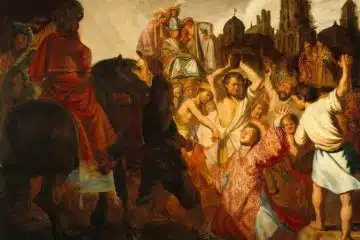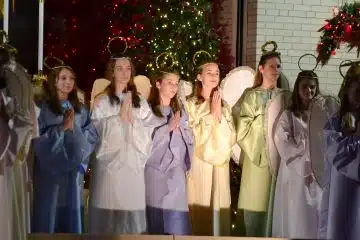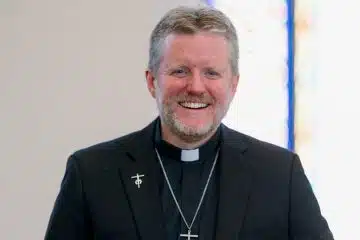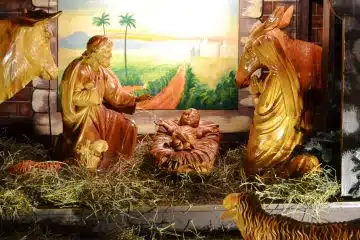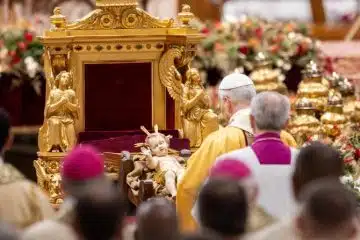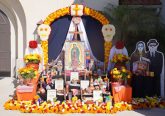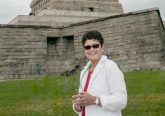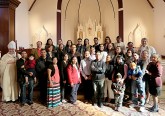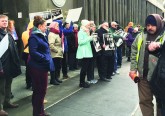Sister Maria’s work will carry on in Hispanic Ministry
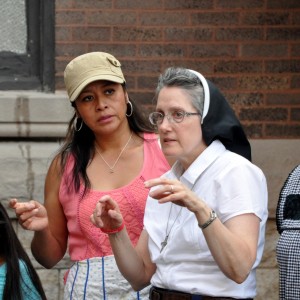
By Mary Bertolini
When St. Mary Church in Dayton opened in 1860, the parishioners were mostly German and Sisters of Notre Dame staffed its school for 23 years.
The city grew, prospered, faltered, and bounced back, and today Dayton is home to diverse cultures, including immigrants from Russia, India, Turkey, the Philippines, Mexico, and several Latin American countries. Through it all, St. Mary’s has remained a solid place for worship, education, and welcome. For the past 14 years, the Sisters of Notre Dame have been represented in the Dayton area in the person of Sister Maria Francine Stacy, assistant director of Hispanic Ministry for the Archdiocese of Cincinnati. In August, sister resigned from her positon to return to teaching, but her compassion, spirit of collaboration, and dedication to social justice has left an indelible impression on many people.
Sister Maria started life with a twin sister. They were raised in Cincinnati and grew up in a solidly Catholic home, best friends all through childhood and on into their call to religious life.
In 1972, Sister Maria began studies at Thomas More College, the college she chose because it was coed and she thought she could have some real fun. “God has a sense of humor,” Sister Maria said, “and instead of introducing me to boys, He introduced me the Sisters of Notre Dame.” She entered that congregation 1976 and never looked back. Buoyed with a degree in English and Spanish, she began teaching at Notre Dame Academy in Covington, Ky. She stayed there 20 years, during which time she earned two master’s degrees and opened a Spanish language department.
“A language learned is not meant to stay trapped in a textbook and copious notes. It needs to be used and shared,” Sister Maria would tell her Spanish class. And because she taught religion as well as Spanish, she would bring students to visit Latinos in migrant camps, inner city clinics, and social service locations, where they could practice Spanish and answer the Gospel call to service by teaching basic English and showing a spirit of welcome to a different culture.
Being out in the field made Sister Maria aware of the need to increase a church presence among the immigrants in matters of faith formation and social justice. When she told Father Bill Jansen, archdiocesan director for Hispanic Ministry at the time, that she felt a desire to do pastoral outreach among Hispanics, he didn’t hesitate. “Well, if you’re interested, there’s a position open in Dayton.”
In June 2002, she assumed the responsibilities of assistant director of Hispanic Ministry in Dayton and northern areas of the archdiocese. “From stability, predictability, and community, I went into uncharted waters,” Sister Maria said. She had no idea of the demographics and didn’t know anyone. She lived alone, something she hadn’t done since joining the Notre Dames. “It was a different, unsettling experience, to say the least,” she remembers, “but God never abandoned me. Quite the contrary.”
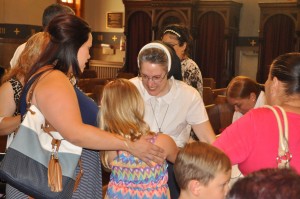
Francine Stacy, for her 14 years of service as assistant hispanic ministry director
in Dayton and northern sections of the archdiocese. The Latino community filled
the church for Mass and hosted a reception on Aug. 8. (Photo by Mary Bertolini)
To see Sister Maria at work in recent times, one wouldn’t think she had ever been alone. “I went out right away to meet people, and I’ve been surrounded ever since.” As she met those in the community, she assessed their needs and developed plans to address them. When asked to describe a typical day, the quick reply came, “There’s no such thing as a typical day and no such thing as regular hours.”
“To see Sister Maria at work, you would think everything was typical,” said Father Louis Gasparini. “When I started as director of hispanic ministry for the Archdiocese of Cincinnati and met her in her ministry environment, I was in awe of how easy she made things look, with her smile and calm manner. It was only after I was on board for a while that I realized the many and diverse challenges she faced on a daily basis.”
Within the church environment, she coordinated programs related to liturgy, evangelization, and catechesis. In the community, she helped plan health clinics, documentation fairs, and immigration discussion programs. On
any given day she might give tax advice; help fill out school registrations; explain visa or legalization processes; visit someone in jail; challenge workplace discrimination; accompany someone to the emergency room; visit a domestic violence victim; welcome new residents; or just listen to someone’s story.
When immigration reform failed during President Bush’s administration, Ohio joined other states in seeking out illegal immigrants for deportation. “Those were very difficult times,” Sister Maria said in a voice charged with emotion. “I would be called to go down to the police station, where someone undocumented brought in for a simple traffic violation ended up facing deportation, but too often I could do nothing to change the situation. I could be there to offer support though, and that counted a lot for many of the victims.”
Sister Maria worked tirelessly to improve relations between the Dayton police and the immigrant community, and over time, Latinos began to be more confident of fair treatment when they called the police for help. Her efforts won her the 2009 Liberty Bell Award, which recognizes a person for time and energy to strengthen the effectiveness of the American system of freedom under law.
It was evident at Sister Maria’s farewell on Aug. 8 that she will be sorely missed. Testimonials were numerous, and the common thread running through them was gratitude. Many said, “What will we do without you?” Sister Maria’s answer each time was,” You will carry on because we have been co-laborers.”
Father Samuel Gonzalez, former chaplain for the Hispanic community at St. Mary’s, said, “It was a great blessing to have worked with Sister Maria. When I met her, I knew that I was in the presence of a religious woman of extraordinary qualities, a woman whom God had reserved for Himself to be at the service of Hispanic immigrants. She is a woman of fragile appearance but of strong character and great heart.”


